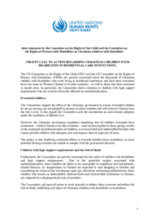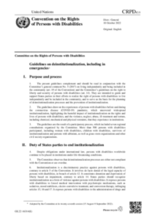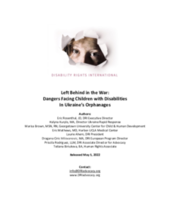Displaying 41 - 50 of 477
The Office of the High Commissioner for Human Rights has published a new report following a request by the Human Rights Council on Support systems to ensure community inclusion of persons with disabilities, including as a means of building forward better after the coronavirus disease (COVID-19) pandemic.
This is an interview with Dragana Ciric Milovanovic, director of European Programs for Disability Rights International (DRI), during the European Launch of the Deinstitutionalization Guidelines, including in emergencies.
The government of Rwanda is in the final phases of its care reform program. Having reintegrated the majority of children from residential care back to families and communities, they are now working on the reintegration of children with disabilities. In this webinar, we hear from policymakers and practitioners on how this has been done and key lessons learned.
Joint statement by the Committee on the Rights of the Child and the Committee on the Rights of Persons with Disabilities on Ukrainian children with disabilities. They express concern about the thousands of Ukrainian children with disabilities who were living in residential institutions and have been evacuated from war zones to Western Ukraine or to other countries, as well as those who have remained in unsafe areas. In particular, they draw attention to children with high support requirements who are negatively affected by institutionalization.
While several interventions have been put in place to address the needs of persons with disabilities in developed countries, their counterparts in low-income countries, such as Ghana, continue to face marginalisation and exclusion. Using user-perspective and co-production approaches, this report analyses existing services for Ghanaians with disabilities and the relevance and usefulness of these services.
These guidelines complement the Committee’s General Comment No. 5 (2017) and its guidelines on the right to liberty and security of persons with disabilities. They are intended to guide and support States parties, in their efforts to realize the right of persons with disabilities to live independently and be included in the community, and to be the basis for planning deinstitutionalization processes and prevention of institutionalization.
This COSP 15 side event was organised by ENIL, in cooperation with Disability Rights Defenders. It addressed the issue of increasing segregation of persons with disabilities in institutions as a result of the war in Ukraine, despite lessons learned during COVID. It focused on the role of the funders in the humanitarian response and the post-war recovery, urging for full compliance with the UN CRPD and ensuring that no funding goes towards institutionalisation of persons with disabilities.
The Returning to Original Vision case story demonstrates reunification of children with disabilities as a critical step in transition. It also highlights the challenges of maintaining organizational vision within a process of transforming services.
On 7 July 2022, the Better Care Network (BCN) and Disability Rights International (DRI) organised an event with disability and child protection actors focused on the situation of children with disabilities in residential care in Ukraine (including those children who have been returned to families or evacuated from facilities since 24 February 2022).
There were an estimated 100,000 children in Ukraine’s institutions before Russia’s war on Ukraine which began in February 2022.







